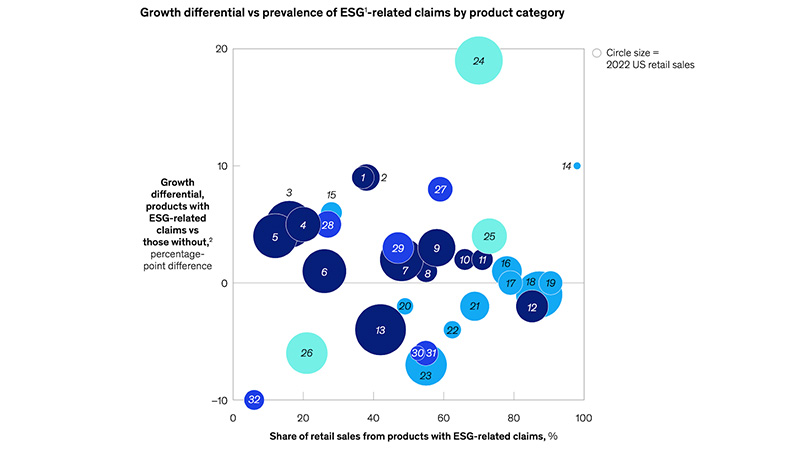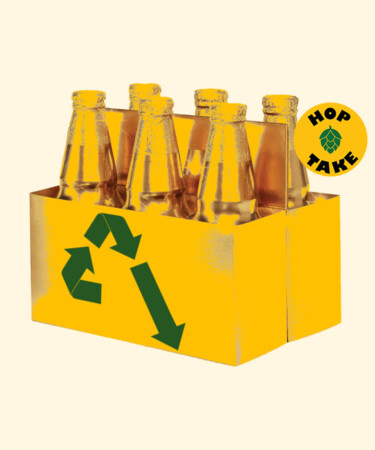Last November, I joined a VinePair envoy on a trip to Verona, Italy, where we spoke together on a panel titled “Should We Care About Wine NFTs?” The royal “we” referred to the mostly Italian, mostly winemaking attendees of Vinitaly’s annual wine2wine conference, and the upshot was, no, we should not. Our audience seemed largely relieved by our takes from the dais (which, in a weird twist of coincidence, we delivered at the same approximate time news broke about the meltdown of FTX, the One Good Crypto Exchange™), and there were a lot of edifying smiles as folks filed out of the auditorium.
Such was not the reception for VinePair editor-in-chief Joanna Sciarrino’s solo presentation at the conference. That one was called “Readers Don’t Care about Sustainability.” Mama mia! I haven’t seen that many distressed Italians since word got out to my extended family that I was planning to take Elmo as my confirmation name.
The premise of Joanna’s Verona surprise was based on data from VinePair that show, pretty conclusively, that people simply do not want to read stories about wineries’ ecologically friendly practices unless they’re genuinely fascinating on their own editorial merit. American drinkers (especially younger ones) may say they care about sustainability in the wine industry, and that it’s something they consider when deciding which wine to buy, but drill into how they actually spend their time and money and you’ll find much less concern about Mother Earth reflected in those choices. There are no atheists in fox holes, and there are precious few environmentalists in American wine aisles (not when price is an object, at least).
Ever since we got back stateside, I’ve been wondering whether the same holds true for beer. The latter certainly can’t claim the former’s lengthy tradition of highlighting its ecological provenance and practices to customers (the concept of terroir, the agricultural nature of grape harvests, etc.). Only once craft beer’s early acolytes began emphasizing the quality and locality of their ingredients did you start to see the American drinking public come around to the idea that beer was an agricultural product, and should be considered accordingly. But as that category has lost its luster, the pendulum has swung back toward more, ah, unnatural products like hard seltzer and whatever we’re calling The Beast Unleashed. You don’t ask where the black cherry flavoring comes from in White Claw; you just drink the White Claw.
If you’ll allow me to invoke a columnist’s license (you have no choice) and introduce some anecdata here: I can’t remember a time in the last five years where I saw a drinker order a beer because it was made with organic ingredients, or fully renewable energy sources, or recycled wastewater. Including myself! I’ll drink those beers, and I may even say “huh, that’s cool” while doing so. But in terms of actively seeking them out in statistically significant numbers? I’m not convinced that was a thing at the height of the farm-to-table/grain-to-glass/whatever heyday of craft brewing, and I’m even more skeptical of the premise now.
Still, anecdata is not data-data, and I’m skeptical of everything as a matter of professional habit. So it was with great interest that I read a recent joint study from McKinsey & Company and Nielsen IQ that investigated this matter using the latter’s actual scan data. “Consumers care about sustainability—and back it up with their wallets,” the report’s title boldly proclaims, and across the five-year period and the 32 consumer-packaged-goods categories it focuses on, that holds mostly true. Except, reader, for Category No. 23 — “Beer, cider, FMB” — which posted some of the worst stats in the entire study:

See that Twitter-blue blob hovering just above the middle of the x-axis? That’s beer, cider, and FMBs, and its position on the chart indicates that products in this category that marketed themselves with “ESG-related claims” (ESG stands for “environmental, social, and governance;” it’s a widely criticized but vaguely useful way investors measure firms’ progressive bona fides) actually did worse than those that didn’t, by a considerable margin.
To get a better sense of why this cohort performed so poorly, I called Jordan Bar Am, a partner at McKinsey Sustainability and the report’s co-author. One reason: The cohort, comprised of roughly 40,000 individual SKUs, uses a lot of the same terms to tout the environmental profiles of its products, and they’re getting stale. “When you look at the beer, cider, and FMB category, what you find is that there’s a particular set of generic environmental sustainability claims,” he says. “At some point certain claims become a bit of an ante, a table stake, and are no longer a form of differentiation in the category.”
Then there’s the fact that breweries, particularly the biggest ones, have a serious ecological footprint, and claims of environmental stewardship are outweighed or undermined by less “green” aspects of their businesses. Brands can actually hurt their perception with consumers by talking the talk without walking the walk, Bar Am says. “I think we’ve seen a lot of examples where companies’ statements kind of get out ahead of their actions. I think that that can really diminish your brand, very quickly, and it takes a while to recover from that.”
If they recover at all. After Coors Seltzer’s launch campaign in 2021 highlighting river cleanups, the brand quickly floundered and failed. The facts that the Coors name has been implicated in a few water-pollution scandals over the years, and Molson Coors’ corporate PAC donates to environmentally unfriendly lawmakers, may have played a part in giving the lie to the splashy rollout. Or maybe it was just the brazen greenwashing that poisoned the well for consumers, or something else entirely. Who knows? But as Bar Am tells Hop Take, “You can’t just take a brand that doesn’t have any tremendous sense of purpose and then throw a claim on it and expect consumers to to suddenly resonate and see purpose there.”
Then there’s the question of the American drinker’s mindset. What do they want from their beer? (And cider, and FMBs; the report did not examine wine and spirits.) Bar Am offers the cautionary tale of a sweetened cereal that began advertising its new natural coloring — something that probably isn’t very important to the person who’s already decided to buy sweetened cereal. “We see missteps from companies when they mismatch the sustainability proposition with what consumers want the brands to do,” he says.
A term like “plant-based” might carry weight with consumers in the highly competitive salty snacks category (a peer group for beer), but come off as bizarre or off-putting if you tried to plaster the same term on your hard tea. It might work, but only if that tea comes in sustainable packaging that you also call out explicitly in your marketing.
Variations that subtle can make the difference between a sustainability claim that resonates and one that falls flat, Bar Am says, and even when a brand has legitimate sustainability track record to back up varied claims (New Belgium’s January 2023 Fat Tire rebrand, which highlights the company’s longstanding and well-documented ecological commitments alongside quality messaging, comes to mind) it’s hard to say how they’ll play together in customers’ brains. “There is an alchemy here, when it comes to the right blend of claims with the brand messaging and how they’re presented,” Bar Am says.
The report’s findings aren’t particularly pretty for the SKUs of Category No. 23, but the consultant says there’s still plenty of opportunity for beer brands to differentiate themselves with ESG-related claims. Granular solutions that address specific drinker expectations and problems, and do so in new and novel ways, have winning potential. Breweries that pack 6-packs with condensed cardboard handles rather than saddling customers with nominally recyclable plastic ones that require special processing, for example, might find traction marketing that trade-up.
Generally speaking, making customers feel less guilty about their consumption habits is going to lead to more growth than trying to disabuse them of those habits, Bar Am says. “Nobody probably wants to be reminded that a lot of the energy [expenditure] associated with beer is actually in keeping the beer cool at the point of sale,” he adds, by way of example. Breweries looking for sustainable growth opportunities have a much better chance winning customers by developing ways to offset the emissions that come from running all those coolers, rather than trying to convince drinkers to buy their beer warm. “Suddenly it becomes interesting, and it’s not making you feel guilty for buying your beer cold,” he says.
🤯 Hop-ocalypse Now
After Founders Brewing Co. settled its racial discrimination lawsuit with a now-former employee at its Detroit taproom in 2019 — which included baffling “I don’t see color”-style deflections and tales of segregated office printers — the company promised to do better. Many were skeptical at the time about the sincerity of the Michigan brewery’s commitment to changing its ways (including your humble Hop Take editor), but after some short-lived calls for a formal boycott, critics mostly contented themselves to wait and see what the company (majority-owned by Spanish mid-major San Mahou Miguel) would make of its second chance. Smash-cut to this past Monday: Founders abruptly announced it was closing its Detroit taproom as another employee at that same location filed another lawsuit alleging some pretty despicable race-based workplace discrimination, harassment, and retaliation. The company claims the timing is just an unfortunate coincidence. Put me down as skeptical on that one, too.
📈 Ups…
Athletic Brewing Co. will soon be available on JetBlue flights… Bang Energy’s parent company extends the deadline on bankruptcy auction, anybody want to go dutch?… Constellation Brands bets Modelo’s Midas touch can finally take aguas frescas mainstream… “Geistiness” will help Rheingeist’s new interim CEO guide the Cincinnati brewery into its second decade and an employee ownership model… I’m kind of charmed by how committed Iron Maiden is to its craft beer brand, now celebrating its 10th (!) anniversary…
📉 …and downs
In a bid to stop the (partially self-inflicted) Bud Light bleeding, Anheuser-Busch InBev is giving free beer to wholesalers’ employees… The National Beer Wholesalers Association clocked April as slightly down on its Beer Purchasers’ Index… After 26 years (!!), Las Vegas’s Gordon Biersch location is going bust…
This story is a part of VP Pro, our free platform and newsletter for drinks industry professionals, covering wine, beer, liquor, and beyond. Sign up for VP Pro now!
